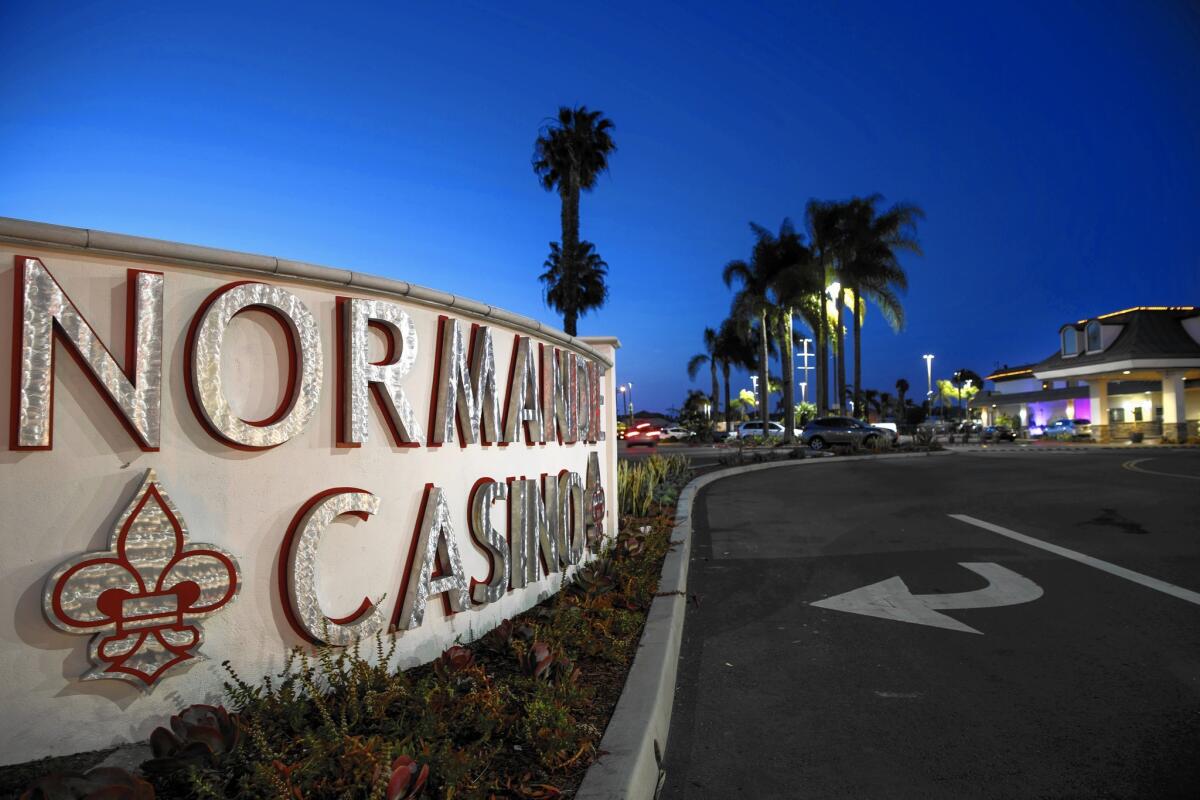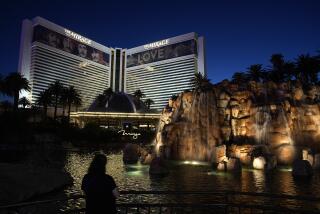Why the Normandie Casino in Gardena may be hitting its limit

- Share via
As a teenager some 30 years ago, Dan Natarelli said he would sneak into the Normandie Casino on Rosecrans Avenue in Gardena to play cards. If he wasn’t winning, he’d simply leave and walk to one of the other five card houses nearby, hoping his luck would change.
But when he was playing in a poker tournament at the Normandie, the last of the original six casinos, several years ago, Natarelli looked around at the worn furniture and sparse crowd and came to a sad realization.
“Normandie is on its last legs, too,” he recalls thinking.
Natarelli might be right. Last week, state officials voted to revoke the gambling licenses of several members of the Miller family, which has owned the casino since 1947, after they pleaded guilty to shielding several high rollers from federal reporting requirements and violating the Bank Secrecy Act. The Millers now have 120 days to find a buyer or face closing their business.
The privately held casino’s finances are unclear, but it has been on a losing streak, observers say. The Normandie benefited from changes to L.A.’s gaming landscape in the early 1980s, when bigger casinos started to crop up along the I-710 corridor, but was eventually unable to keep up with the competition.
The first real sign of trouble may have been when the Larry Flynt-backed Hustler Casino opened less than two miles away in 2000, skimming away patrons with more modern facilities. Recently, the Bicycle Hotel & Casino in Bell Gardens finished a seven-story hotel last year, and the Commerce Casino upgraded its hotel rooms, lobby and restaurant over the last two years.
Combined with a lull in the nearly decade-long Texas Hold ‘em craze, which has led gambling houses to close poker rooms nationwide, the odds weren’t in the Normandie’s favor, observers say.
“It was just their turn to go down,” said Mason Malmuth, the author of 16 poker books who once was a Normandie regular.
George Miller bought the casino, then known as the Western Club, in 1947 and it grew into one of the bigger card clubs in Gardena. During the area’s peak in the early 1980s, most area clubs had 35 poker tables running each night, more than any casino on the Las Vegas Strip, Malmuth said.
“There was nothing in Las Vegas that approached anything like what was in Gardena,” he said.
But competition started cropping up, including the Commerce Casino, which opened in 1983, and the Bicycle, which had its grand opening the following year, and Gardena businesses started shutting down. The Normandie tried to take advantage of the narrower field by offering new games such as pai gow and bringing in Elvis impersonators, mariachi bands and comedians to draw bigger crowds.
The Normandie got a shot in the arm in 1987, when a Los Angeles Superior Court judge struck down an 1885 law that outlawed “stud-horse poker,” which was interpreted to include seven-card stud and Texas Hold ‘em.
Malmuth was at the Normandie during the first week it offered Texas Hold ‘em and “it was packed,” he said. “People wanted to try something new.”
Business was good enough that the Normandie added a 240-seat showroom in the early 1990s and outlasted its competition to become Gardena’s last remaining card house, at least until Flynt opened his $35-million Hustler Casino in 2000.
It’s unclear what effect the Hustler had. Gardena is entitled to 12% of the monthly gross revenue from the Normandie and the Hustler, and the city’s gambling proceeds have grown dramatically since the casino opened.
In 2000, Gardena collected $2.9 million in fees. That figure jumped to $4.1 million the following year, growing to nearly $9.5 million in 2014, according to a city report.
City officials would not say how much each casino paid individually, but the report noted that “the Normandie Club has continued to struggle financially, with some periods of recovery.”
But players such as Natarelli said most serious gamblers preferred the Hustler, which did a better job of capitalizing on the Hold ‘em trend by offering tournaments with bigger prizes.
At the recent Liz Flynt Spring Classic in April, the Hustler awarded players more than $500,000 in prize money in a single tournament — with the winner walking away with $91,000. At the Normandie, weekly tournament prize pools range from $1,500 to $3,000, according to the casino’s website.
“One of [the Normandie’s] failures wasn’t providing big enough tournaments,” Natarelli said.
The difference between the two casinos was stark on a recent Saturday night. At the Hustler club, the parking lot was almost full, with a uniformed guard constantly circling in a golf cart. Gamblers passed two BMW convertibles the casino was auctioning off before getting to the casino floor, where the sound of players clicking their chips filled the room and employees in black tuxedos paced the floor or brought gamblers drinks and food.
Only two tables were empty.
At the Normandie, a security guard stood by the front entrance, opening the door to gamblers and keeping watch over the half-empty parking lot. Inside, gamblers crowded around some tables, but 18 were empty except for nongamblers watching the Portland Trail Blazers-Golden State Warriors playoff game, ignoring signs that said not to sit at empty tables.
Patrons drank and ate at the casino bar, but the Lucky Dragon Cafe, one of Normandie’s snack bars, was unmanned, its refrigerators empty.
But casinos like the Hustler and Normandie have been facing a decline in poker’s popularity.
Last year, 6,420 players paid $10,000 each to enter the World Series of Poker main event at the Rio hotel-casino in Las Vegas, down from a high of 8,773 in 2006. The Tropicana hotel-casino in Las Vegas shut its poker room in 2013, replacing the tables with more-profitable slot machines, and other casinos in Mississippi and Fort Lauderdale, Fla., also stopped offering Hold ‘em.
“Poker is collapsing as a casino game,” said William Thompson, a professor of public administration at the University of Nevada, Las Vegas.
Poker generates relatively low revenue for casinos, which can either take a cut of tournament fees or charge players to play in cash games. Like most California gambling establishments, the Normandie can only offer card games, so “it’s bound to suffer,” Thompson said.
Some locals are holding out hope that the Normandie finds a way to stay in business. “It’s an institution, the last of its kind,” said Steven Anderson as he entered the casino earlier this month. “It would be sad if it wasn’t here anymore.”
Twitter: @byjsong
ALSO
This is how California’s governor wants to make it cheaper to live here
Why did El Niño miss SoCal? It’s complicated, National Weather Service says
More to Read
Sign up for Essential California
The most important California stories and recommendations in your inbox every morning.
You may occasionally receive promotional content from the Los Angeles Times.











